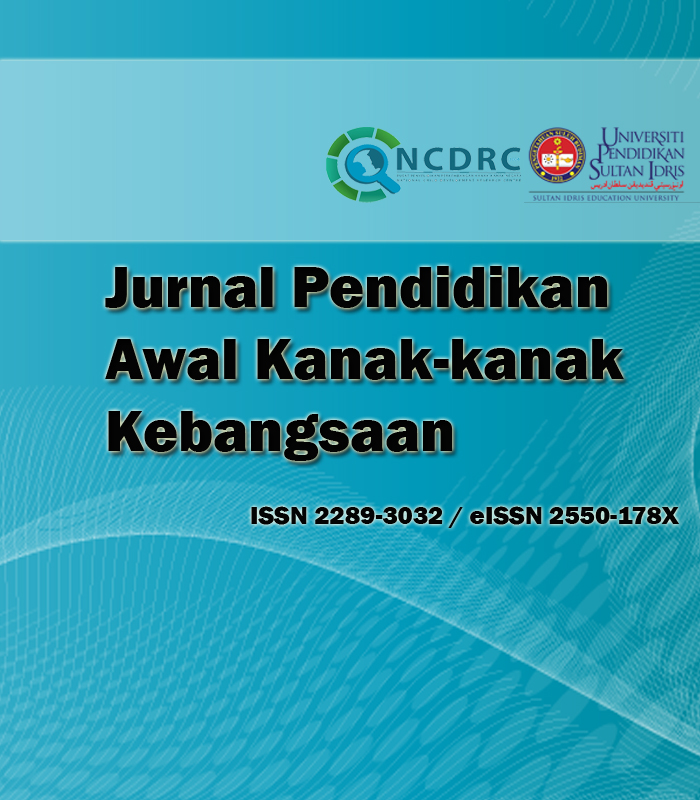Exploring the Role of Storyline, Characters, and Interactive Storytelling Techniques in Fostering Socio-Emotional Learning in Early Childhood Education
DOI:
https://doi.org/10.37134/jpak.vol13.2.6.2024Keywords:
Socio-emotional learning (SEL), Interactive storytelling, Big Books, Early childhood education, Teacher evaluationsAbstract
This study explores the integration of socio-emotional learning (SEL) competencies in early childhood education through interactive storytelling with Big Books. It evaluates how storytelling sessions in a kindergarten setting promote SEL development, focusing on themes like self-awareness, empathy, and problem-solving. The research also examines how characters, settings, and events foster SEL growth. Additionally, creative storytelling techniques such as varied voice modulation, body language, and interactive prompts are analyzed for their role in enhancing children’s emotional understanding and encouraging social interaction. The study employs qualitative methods, including interviews with preschool teachers and observations of children aged 4 to 6. Data collection is based on evaluations by kindergarten teachers, who assess the programme's effectiveness using SEL competency integration and storytelling techniques. Thematic analysis identified key findings such as a successful SEL competency integration, improved social interaction, and enhanced emotional understanding through character and setting portrayal. Children engaged more with stories where characters modelled empathy, cooperation, and problem-solving. Techniques such as voice variation and body language promoted active participation, while clearly illustrated emotions helped children relate better to the characters' feelings. Children also showed increased interest and enthusiasm in reading activities, demonstrating joy during storytime. Educators should incorporate creative storytelling techniques and delivery to support holistic SEL development in early childhood education. This qualitative approach provides valuable insights for educators and policymakers to improve early literacy and SEL programs.
Downloads
References
Amsari, Dina & Wahyuni, Etri & Fadhilaturrahmi, Fadhilaturrahmi. (2024). The Social Learning Theory Albert Bandura for Elementary School Students. Jurnal Basicedu. 8. 1654-1662. 10.31004/basicedu.v8i2.7247.
Assessment Work Group. (2019). Student social and emotional competence assessment: The current state of the field and a vision for its future. Chicago, IL: Collaborative for Academic, Social, and Emotional Learning
Bateman, A. (2020). Young children’s affective stance through embodied displays of emotion during tellings. Text & Talk, 40(5), 643-668. https://doi.org/10.1515/text-2020-2077
Blewitt, C., O'Connor, A., Morris, H., Nolan, A., Mousa, A., Green, R., Ifanti, A., Jackson, K., & Skouteris, H. (2021). "It's Embedded in What We Do for Every Child": A Qualitative Exploration of Early Childhood Educators' Perspectives on Supporting Children's Social and Emotional Learning. International journal of environmental research and public health, 18(4), 1530. https://doi.org/10.3390/ijerph18041530
Brockington, G., Gomes Moreira, A. P., Buso, M. S., Gomes da Silva, S., Altszyler, E., Fischer, R., & Moll, J. (2021). Storytelling increases oxytocin and positive emotions and decreases cortisol and pain in hospitalized children. Proceedings of the National Academy of Sciences of the United States of America, 118(22), e2018409118. https://doi.org/10.1073/pnas.2018409118
Catala, A., Gijlers, H., & Visser, I. (2022). Guidance in storytelling tables supports emotional development in kindergartners - multimedia tools and applications. SpringerLink. https://link.springer.com/article/10.1007/s11042-022-14049-7#citeas
Friedman, S. (2020). The power of storytelling in early childhood: Helping children process the coronavirus crisis. National Association for the Education of Young Children (NAEYC). https://www.naeyc.org/resources/blog/storytelling-coronavirus
Goh, P. S. C., & Wong, K. T. (2013). Beginning teachers’ conceptions of competency: Implications to educational policy and teacher education in Malaysia. Educational Research for Policy and Practice. Advance online publication. Doi: 10.1007/s10671-013-9147-3
Goldstein, Thalia & Winner, Ellen. (2012). Enhancing Empathy and Theory of Mind. Journal of Cognition and Development - J COGN DEV. 13. 10.1080/15248372.2011.573514.
Gunawardena, M., & Brown, B. (2021). Fostering values through authentic storytelling. Australian Journal of Teacher Education, 46(6), 36–53. https://doi.org/10.14221
Harms, W., & DePencier, I. (1996). Dewey creates a new kind of school. Retrieved from http://www.ucls.uchicago.edu/about-lab/history/index.aspx
Landrum, R. E., Brakke, K., & McCarthy, M. A. (2019). The pedagogical power of storytelling. Scholarship of Teaching and Learning in Psychology, 5(3), 247–253. https://doi.org/10.1037/stl0000152
Meirink, J. A., Imants, J., Meijer, P. C., & Verloop, N. (2010). Teacher learning and collaboration in innovative teams. Cambridge Journal of Education, 40(2), 161-181.
Mondi-Rago, Christina & Giovanelli, Alison & Reynolds, Arthur. (2021). Fostering socio-emotional learning through early childhood intervention. International Journal of Child Care and Education Policy. 15. 10.1186/s40723-021-00084-8.
Social and emotional learning: Recent research and practical strategies for promoting children’s social and emotional competence in schools. Prospects, 49(1), 1–14. https://doi.org/10.1007/s11125-019-09489-7
Zhou, Xiaochen. (2024). Sociocultural Theory in Early Childhood Education. Lecture Notes in Education Psychology and Public Media. 51. 190-196. 10.54254/2753-7048/51/20240981.
Downloads
Published
How to Cite
Issue
Section
License
Copyright (c) 2024 Aina Yasmin Mohd Amin, Adhara Ahmad, Hashimah Hashim

This work is licensed under a Creative Commons Attribution-NonCommercial-ShareAlike 4.0 International License.





